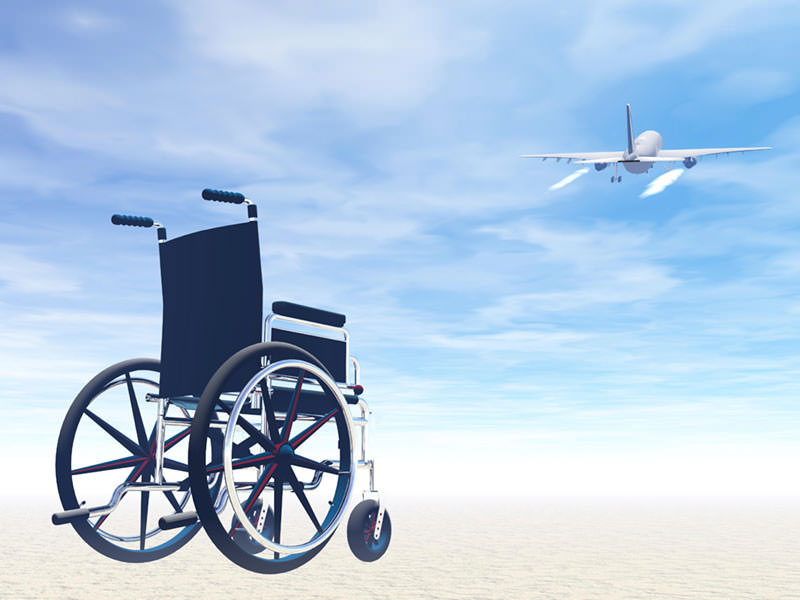
Why we need to improve transatlantic travel conditions for people with disabilities

Illustration by Fotosearch.
In Prague, access to the famous baroque library at the Klementinum has an air that is fittingly Kafkaesque. Especially if the visitor is moving about on a wheelchair. A small ramp leads to a landing, from which a stairway and an elevator lead to the library. But because I’m told that the elevator is “only for books,” my three guardian angels decide to carry me up the 12 steps that lead to the library–which, by the way, can only be seen from afar.
In spite of the fact that at a trendy restaurant we were ignored to the point of almost being kicked out (they alleged they had no room to accommodate my wheelchair), the people of Prague are kind enough, and the whole matter is forgotten before the magnificence of the city.
Things get worse in imperial Vienna–a city classically associated with extreme good manners–where there is no reason to complain, given that certain basic conditions are present, but for the curious attitude of many of its inhabitants. The city shows its most beautiful face: clean, safe, unpolluted and, of course, monumental. It’s a magnet, any way you’d look at it, and the new facilities of the Albertina museum are exemplary. Vienna has just been selected as among the best European cities to live in, if not the best. It would be worth asking if the survey considered life for the “physically challenged,” to use the politically correct term.
Here, tourism represents an essential source of income, which makes it even more surprising that there is such a lack of tact by some of its citizens towards those who need certain conditions to feel less different. If it’s merely a cultural issue, let’s agree that treating a tourist well is excellent business. It’s not by chance that we return to previously visited places more because of the memories of the people we’ve encountered than the landscape. The human connection always wins.
In less than a week in Vienna, this writer suffered mishaps that force me to bear witness and offer advice to the unsuspecting traveler with limited or no mobility–from the contempt of waiters in restaurants, to a lack of courtesy in elevators, to an unheard of narrow-mindness in a certain concert hall. There was also a shameful incident on board my return flight, which, courtesy of airline negligence, resulted in an ankle sprain that I’m still recuperating from after several weeks, with all the complications that carries with it.
When the “able” person makes the “disabled” person feel that he or she gets in the way, is a nuisance or is not welcome, that “able” person commits discrimination, plain and simple. That was the prevalent feeling in Vienna, opposite to the experiences in European capitals as disparate as London, Madrid or Berlin, where, like in the United States, one perceives the open intention of inclusion, of making the life of the disabled a bit easier. That goes from a cordial smile to offering help, tacit acts of courtesy and civility. Too often, hiding behind the excuse of a strict (which doesn’t mean inflexible) respect for the rules and regulations, flagrant injustices are committed, forgetting that the exception to the rule can also be part of the rulebook, and that, once in awhile, it is good to apply it, either through negotiation or improvisation. All comes back to the premise that treating people well is not only the right thing to do, but also good business.
Accustomed to the protections afforded by the American Disability Act, those of us traveling around the United States might take for granted the facilities available for the disabled. I was also heartened to learn, upon my return, that the U.S. Senate passed the Federal Aviation Administration reauthorization bill, which contains four key provisions for disabled passengers. This is social progress that must be recognized and celebrated. And while some of these protections are the rule of law, what is not mandated by law is the general attitude, the smiling and the willingness to help out, and that is worth much more than a ramp. It’s what is most appreciated.
A phrase by the librettist Hugo von Hofmannsthal in his “Der Rosenkavalier,” emblematic of a long ago Vienna (which, regardless, will continue to be one of my favorite cities), comes to mind: “In the how lies the difference.” It’s a detail that no few Viennese will have to learn sooner or later in a globalized world, where more and more people have the right to travel, happily, as it should be.
Recent Content
-
Artsarticle ·
-
Artsarticle ·
-
Artsarticle ·
